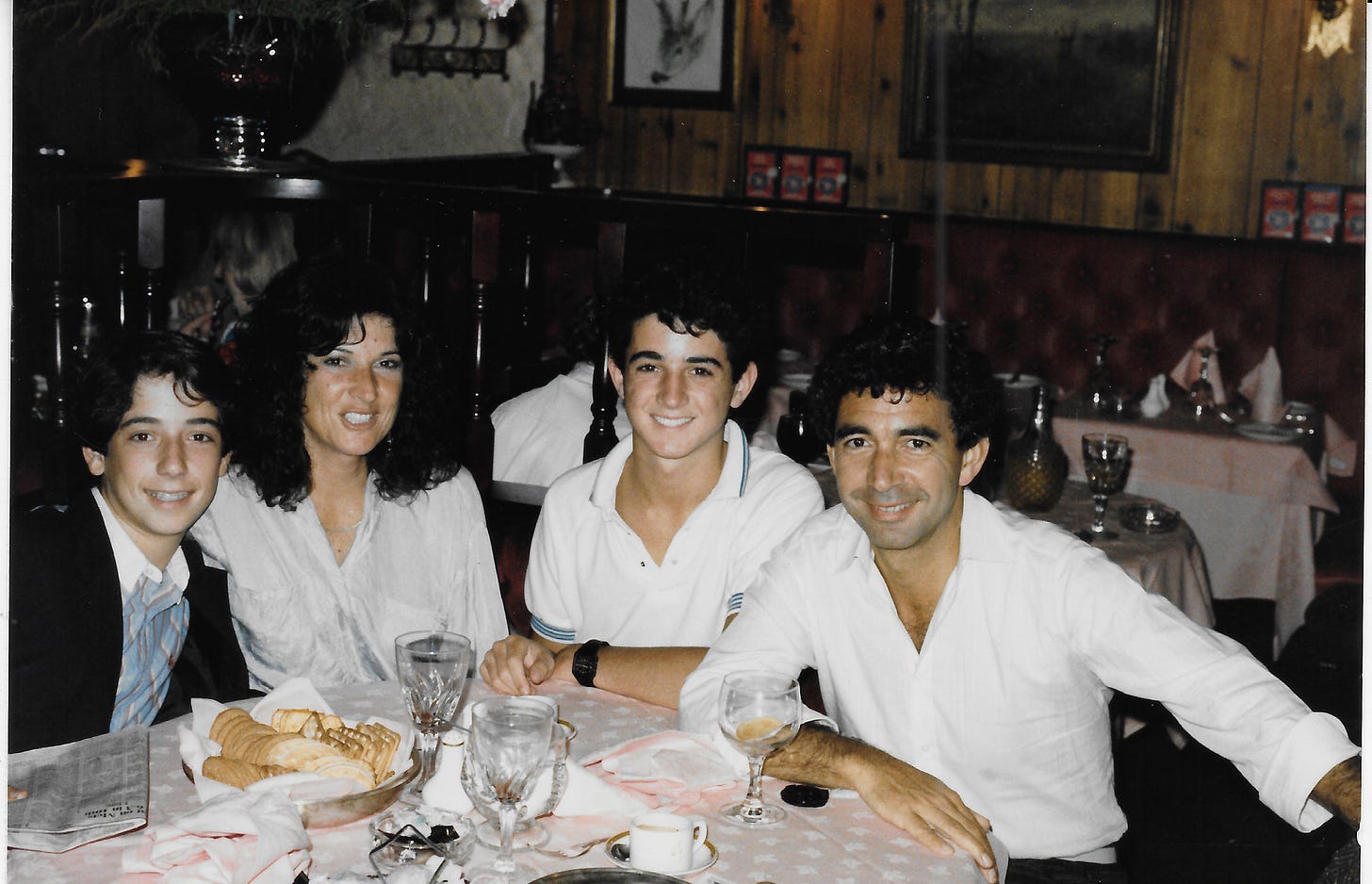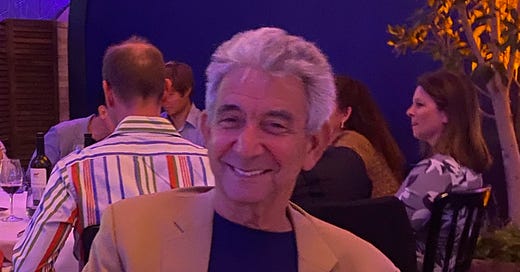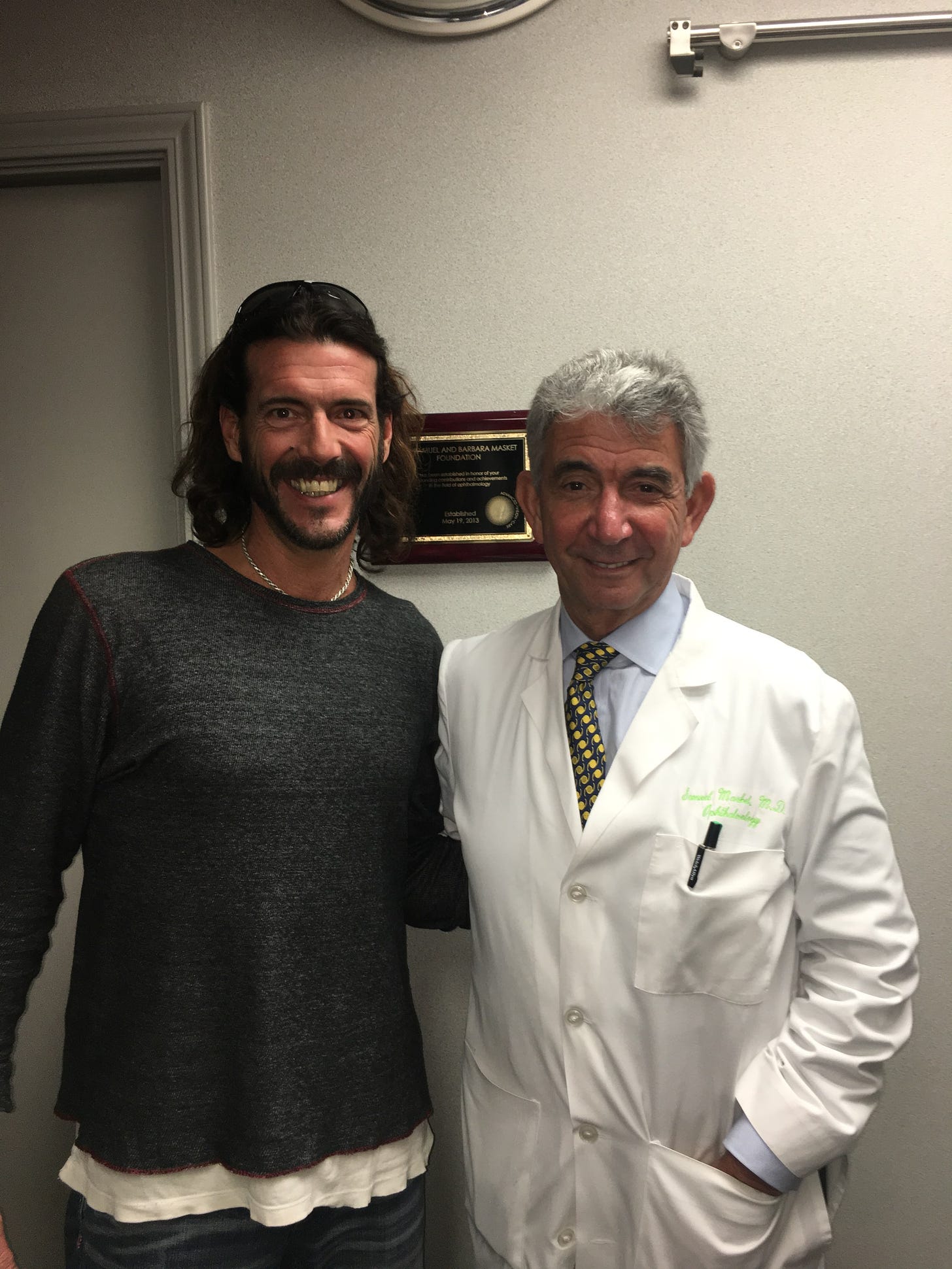This is 79: Samuel Masket, Responds to The Oldster Magazine Questionnaire
A special edition of the questionnaire featuring my uncle, the eye surgeon—whose comment to me at 10 that I'd "never be one digit again" sparked my obsession with milestones.
From the time I was 10, I’ve been obsessed with what it means to grow older. I’m curious about what it means to others, of all ages, and so I invite them to take “The Oldster Magazine Questionnaire.”
Here, my uncle, opthalmic surgeon Dr. Samuel Masket (and the person who sparked my obsession at age 10) responds. - Sari Botton
Dr. Masket is Clinical Professor of Ophthalmology, Geffen School of Medicine, UCLA and founding partner of Advanced Vision Care in Los Angeles. He has served on the Board of Trustees of the American Academy of Ophthalmology and is past president of the American Society of Cataract and Refractive Surgery. He has served as an Associate Examiner for the American Board of Ophthalmology. Dr. Masket has published well in excess of 150 peer reviewed articles and 2 textbooks, he serves on the Editorial Board of several medical journals, and is the Consultation Section editor emeritus of the Journal of Cataract and Refractive Surgery. He has been an invited guest surgeon and given numerous named lectures globally. He presented the 1998 Binkhorst Medal Lecture and the 2013 Kelman Memorial Lecture at annual meetings of the AAO, and more recently, lectures named for close colleagues, Dick Lindstrom and the late Alan Crandall.
Currently Dr. Masket is Chair of AAO Senior Ophthalmologist Committee. His clinical and research interests relate to complex cataract and lens-based surgery. He holds US and European patents for IOL design related to Pseudophakic Dysphotopsia.
In 2013, Dr. Masket embarked on a new venture, establishing the Samuel and Barbara Masket Foundation. Its missions are to provide anterior segment eye surgical care for the underserved, to train fellows, and support clinical research. Patient care was initiated in 2015.
—
At my 10th birthday party at Long Beach Bowl in October, 1975, you said to me, “Well, you’ll never be one digit again.” That blew my mind and began my life-long fascination with getting older, what each milestone in life was supposed to mean, and when you were supposed to reach each of them. In a way, it was the impetus for creating Oldster Magazine. A) A belated thank you. B) Do you say, “You’ll never be one digit again,” to all newly minted 10-year-olds?
The short answer is YES! But that question opens another discussion. I fear that we often say things to impressionable, perhaps younger, people without realizing how impactful the comments might be. On more than just a few occasions over the course of my career, I have been astonished to hear my words come back to me from trainees or others; I sense that we need to take heed of what we say, or how we say things to people who may look to us for guidance, etc.
This feels like a good time to confess that in fifth grade, when my mom brought me to your office in New Jersey because I was complaining of difficulty seeing far, I completely faked my eye exam. I just wanted glasses like my best friend had. Did you know I was faking?
Of course; do you think that you “patented” that ploy?
I fear that we often say things to impressionable, perhaps younger, people without realizing how impactful the comments might be.
As an ophthalmic surgeon, I thought you might be able to tell us something about what naturally happens to our eyes as we get older, and what we can do to mitigate some of the ways our vision becomes increasingly impaired. Once you told me that wearing sunglasses was key. What, if anything, can we do to slow down the effects of aging on our eyes?
This could be a very long-winded response; after all, we experience change in virtually all aspects of our eyes over time. Consider the appearance of our eyelids with age and how many of us opt for cosmetic blepharoplasty (“eyelid plastic surgery”).
However, peoples’ chief concerns relate more to our ability to see, rather than the appearance of our eyes. While not a true disease, presbyopia (“aging vision”) or loss of the ability to focus at near ultimately impacts virtually all of us; this condition is why people in their 40s start to need reading glasses if they never needed eye glasses earlier in life. It is caused by a progressive hardening of the lens inside our eye, causing it to lose flexibility. Despite many “home remedies,” exercises, diets, and a host of holistic approaches, it is unavoidable and presently incurable, albeit imminently treatable with a pair of simple reading glasses. Since most people detest the problem and dislike eye glasses, there are a number of options that can be considered: Contact lens wear, laser vision correction, surgical lens replacement, and eye drops to make the pupil smaller are all viable methods, but not without risk and expense.
The most common disorders, cataract, macular degeneration, and glaucoma are diseases that are primarily related to the aging process in the majority of cases, although in some people are related to family genetics. By and large they are not preventable but can be treated, each condition having its own rates of success. More than 3.5 million cataract surgeries are performed annually in the US with success rates hovering above 95%. Although there have been many attempts to prevent cataracts with diet, vitamins, etc., at present there is no proven medication or other method to reverse or retard cataracts, though research continues in this arena. Sunglasses with ultraviolet blocking lenses may retard cataract development and progression.
In general, wearing eye protection with use of UV (ultraviolet) blocking sunglasses and a healthy diet in combination with appropriate check-up exams are the best way that people can stave off eye damage over time, though there are no “magic cures.”
The eyes, and retina in particular, are extensions of the brain. Anything that fosters brain health will also be good for eye health, and that is where diet comes into play. Diets that are high in antioxidants and low in carbohydrates are to be recommended; Mediterranean diets are likely the best for overall health, including the eyes. While people with Macular Degeneration may benefit from use of a certain vitamin and mineral regimen, there is no evidence that such a strategy works for normal individuals. Those with a family history of either glaucoma or macular degeneration should be under the care of an Ophthalmologist or specially trained Optometrist.
In general, wearing eye protection with use of UV (ultraviolet) blocking sunglasses and a healthy diet in combination with appropriate check-up exams are the best way that people can stave off eye damage over time, though there are no “magic cures.”
Tell us about the Samuel and Barbara Masket Foundation and what it does.
The Samuel and Barbara Masket Foundation believes that “Everyone Has the Right To Good Sight.” We provide pro bono eye surgery for cataract and other eye conditions for the unserved and underserved population in Southern California. However, we have had referrals from as far away as Afghanistan. Through our Fellowship program we are training the next generation of ophthalmologists in management of complex eye surgical conditions. To date we have provided roughly 100 surgical procedures. We are supported by an annual Fundraising Gala, generous donors, and corporate grants. Our surgeons volunteer their expertise but we have expenses for anesthesia services and surgery center fees.
How old are you?
I turned 79 earlier this month
Is there another age you associate with yourself in your mind? If so, what is it? And why, do you think?
Over a long life I have had several calendar years that I like to remember with pleasure, and some that challenged me greatly. Regarding the latter, I distinctly remember beginning mid-life crisis at age 35. But, after a great deal of soul searching, etc., by age 42 I started to gain confidence and comfort with all phases of my life.
Would I trade wisdom for youth? No!! I would only go back with what I have learned, not without it. But, 42 was pretty sweet!
Do you feel old for your age? Young for your age? Just right? Are you in step with your peers?
We are likely the worst ones to make that assessment; others can judge us with far greater objectivity, but most say that I seem younger than the numbers would suggest. However, I eat well and remain very active both physically with regard to exercise and intellectually in terms of scientific writing, teaching and managing the Foundation. Those activities, in combination with good health and a full head of hair, give me the sense that I am “young” for my calendar age. That said, the calendar never lies and must be respected.
What do you like about being your age?
The older we become, the better we understand who we are, what motivates us, what are our strengths and weaknesses, our karma, etc. I no longer aggravate over skills that I may not possess or things that I did not accomplish. I have more time to appreciate my family members, my grandchildren in particular.

What is difficult about being your age?
More or less, I was a child of the 60s, graduating college in 1964. Listening to Joan Baez, Bob Dillon and Peter, Paul and Mary, I had a great deal of optimism that the world would get better as I got older. How wrong I was!! While technology has made many aspects of life easier, I am so dismayed to see the direction of our country with regard to racism, division, corruption and with totalitarianism as a distinct possibility.
What is surprising about being your age, or different from what you expected, based on what you were told?
I suspect that what surprises me the most is that I think very much as I did years ago. In my mind I am not an old person, though as I said, the calendar does not lie. Mentally I feel very much the same as I always have and don’t believe that age has impacted my thought processes or “internal self.”
I adore my four grandchildren, ages 14 through 20 and want to be present to watch them evolve into adulthood. Moreover, I have a successful 56-year marriage and hope that we can share several more of those milestones.
What has aging given you? Taken away from you?
Aging has given me insight to my strengths, weaknesses, desires, and karma. With regard to the latter, I have come to understand that nothing has ever come easy for me; I have needed to work very hard to achieve my goals, whether lofty or simple. I have looked on, with some degree of jealousy, as others seemed to have an easier path to their end points.
But, on the downside, age has taken away relevance. Society doesn’t seem to have a place for vital octogenarians (or those nearing it). Except for health care advertisements we are not part of the marketplace. Nobody designs clothing lines for us, etc. We are “The Invisibles”.
Of course, it should go without saying, that time does impact us physically. I would love to have my real teeth, but technology has allowed me to function normally with 13 dental implants!!
What are some age-related milestones you are looking forward to? Or ones you “missed,” and might try to reach later, off-schedule, according to our culture and its expectations?
Earlier in life I often faulted myself for not making more distinct plans, allowing life to occur and then reacting to the situation rather than trying to control all of the potential variables. But, as mentioned earlier, I now sense that is my karma and I am not interested in changing it now. I have no “5 Year Plans.” That said, I adore my four grandchildren, ages 14 through 20 and want to be present to watch them evolve into adulthood. Moreover, I have a successful 56-year marriage and hope that we can share several more of those milestones.
What has been your favorite age so far, and why? Would you go back to this age if you could?
Age brings wisdom if we allow that to occur; that cannot happen in a vacuum. So, would I trade wisdom for youth? No!! I would only go back with what I have learned, not without it. But, 42 was pretty sweet!
Is there someone who is older than you, who makes growing older inspiring to you? Who is your aging idol and why?
As an Ophthalmologist I cared for and knew many people in their 90s and beyond. Many were inspirational; they had good health, cared well for themselves, and stayed intellectually interested. That is the “formula.”
As I often stated to patients and colleagues, “Age is Not a Diagnosis.” One should do whatever they are capable and desirous of, irrespective of age; the number is irrelevant.
What aging-related adjustments have you recently made, style-wise, beauty-wise, health-wise?
Unfortunately, the Pandemic has impacted much about these subjects. With its onset I stopped seeing patients in the office and curtailed much of my social life. So, I tend to wear very casual clothes for most of my activities. I recall sensing that I wanted to come out of the Pandemic the way I went in, but I am not certain that is the case.
What’s an aging-related adjustment you refuse to make, and why?
None; that is pure foolishness, as you must respect the calendar. That said, as I often stated to patients and colleagues, “Age is Not a Diagnosis.” One should do whatever they are capable and desirous of, irrespective of age; the number is irrelevant.
What’s your philosophy on celebrating birthdays as an adult? How do you celebrate yours?
I have collected fine wines over many years and wine-food combination is a major hobby for me. So, as I have evolved over time, and as I recently experienced, sharing one of my wonderful wines with my wife over a superb dinner at one of our favorite restaurants is all that I need. Works for me. But I do plan milestone birthdays with family and love the experience.








What a wonderful uncle you have! I'd like to add that cataract surgery was for me and almost everyone I know transformative. While there are many surgical treatments for age-related problems (such as replacing joints and disks), none is an instant fix like cataract surgery. In my case, the new lens I received was bi-focal and allowed me not only to throw away my reading glasses but also to stop wearing the contact lenses I'd had since I was a teenager. The surgery didn't restore the sight of my youth but fixed it entirely. Many people think of aging as a steady physical deterioration. Cataract surgery can undermine that assumption, doubling its benefits.
He is a good role model.